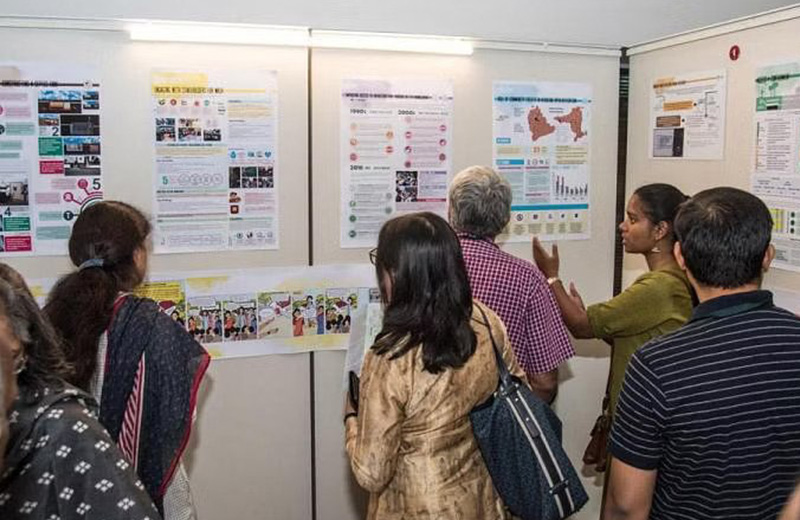Featured in THE NEW INDIAN EXPRESS
CHENNAI: A colourful comic depicts two cartoon women in the slum of a town, Priya and Meena, who are wondering why their kids have been falling sick lately. In enters a sanitation facilitator who asks them to supply samples of their drinking water stored at home. Upon testing, faecal coliform bacteria is discovered to the women’s horror who believed that their water was clean.
The facilitator then shows them how water can get re-contaminated at any point in its journey from the fetching and transporting to handling and storing, and finally, consuming it. When asked if they had remembered to wash their hands after open defecation in the fields, the women realise that they had not, and had gone to fetch water for their households immediately after. The facilitator steps in to highlight the now-evident connection between handwashing and water contamination. The women are eager to learn how they can keep their families disease-free and are taught how simple steps like boiling drinking water can treat the water.
The facilitator in the comic represents researchers from the Tamil Nadu Urban Sanitation Support Programme (TNUSSP) led by the Indian Institute for Human Settlements (IIHS), and their conversation with womenfolk depicts their community-led, participatory interventions. The initiatives explained in the comics are led by WASH practitioner Niladri Chakraborti, who leads the City-Wide Inclusive Sanitation Program (CWIS) in Tiruchi.
The single-strip comic conveys the intended messaging with bright, realistic illustrations. It is accompanied by succinct text and graphics that spell out the field exercises and methodology employed to investigate a sanitation issue. Launched in 2015 to assist the Tamil Nadu government in achieving sustainable urban sanitation goals, the TNUSSP has now created a comic guide to disseminate water, sanitation, and hygiene (WASH) practices in schools and urban communities.
Art for awareness
IIHS’s Abhilaasha Nagarajan, who helped create the comics, says the aim is to make TNUSSP’s extensive research findings accessible to everyone involved in sanitation. To explain science-based concepts like water pathway and water recontamination, for instance, require not just data and terminology, but novel ways of communication. And that’s where this medium lent itself to their cause. Their emphasis was on powerful yet clear storytelling that could both captivate attention and retain interest, she says.
“When key messages related to urban sanitation such as faecal sludge management and WASH are conveyed through compelling and relatable characters in a story format, they are well received by audiences. A comic is an innovative and effective method for communities to narrate their stories and take them to a wider audience,” she adds. Upcoming comics will tackle menstrual health management, and hand washing practices at schools.
The comics also take into account the stakeholders who are directly involved in the sanitation process. In one strip, the TNUSSP team tells de-sludging operators of the hygiene and other health hazards they face — as well as how they, and their families, can avail free medical check-ups and counselling at camps set up by TNUSSP for sanitation workers, in collaboration with Karpagam Medical Trust. “Showing sanitation workers the comics about the free health camps is a new approach. When these health camps get scaled across Tamil Nadu, it will be useful to employ the comics then.”
Kindling curiosity for change
The comics, alongside other fun, accessible educational tools are being displayed at schools, community interactions, and at institutional exhibitions targeted at urban sector professionals, and through social media. “When the TNUSSP team took the comic characters we created to school WASH sessions, we found that kids could relate to the emotions displayed by these characters and also connect them to the issues they observed in their surroundings. For instance, after seeing the panel on safe water handling practices in our comic, we saw that children consciously preferred to wash their hands before fetching water and after visiting toilets,” notes Abhilasha.
Hand hygiene to prevent and contain disease outbreaks is top priority on the global development agenda in the wake of the pandemic. The calamity also underscored poor access to safe drinking water, a handwashing facility with soap and water, and toilets. At such a crucial time, these resources help bridge the chasm between knowledge, access, practice, and ultimately, behavioural change in society. What better way to empower people in social development than through art.
The TNUSSP comics can be accessed on tnussp.co.in
Creativity galore
The CWIS and the IIHS’ Media Lab teams are currently training local champions in city neighbourhoods to find and narrate audio-visual stories on WASH and the environment using their mobile phones. In another TNUSSP multimedia campaign titled ‘Kakkaman’ (which is on YouTube), actors dressed as faecal sludge matter sing about the hazards of not being disposed off properly.



Leave A Comment
You must be logged in to post a comment.